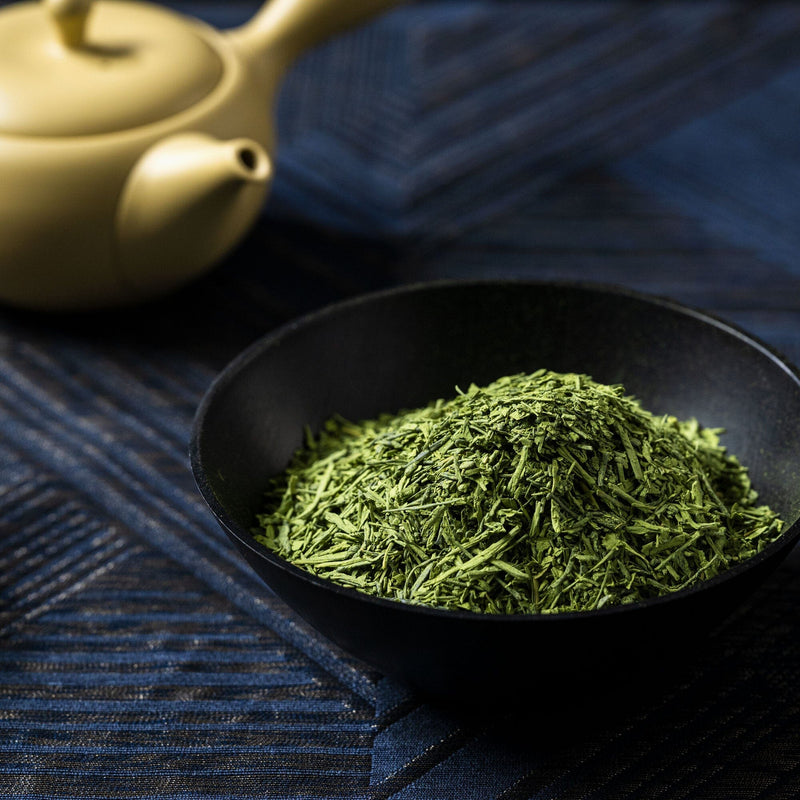- All Tea •
- Teas From Taiwan • Iron Goddess of Mercy
"Starting with the wonderful aroma, this tea transports me to a better place. Truly one of the great teas of the world." - Sandra











Iron Goddess of Mercy



Smooth and rich with aromas
of roasted chestnut and
notes of dried apricot
About this tea
Also known by the name Tie Guanyin, Iron Goddess of Mercy is said to have been discovered by an elder farmer named Wei who lived in Anxi county, Fujian province. Wei was poor, but the pious man who hiked the long trail to tidy up the dilapidated village temple every week. The merciful bodhisattva Guanyin visited Wei in his dream, telling him to check behind the temple for a gift in honor of his dedication. Wei awoke the next day and hiked to the temple, finding a tea tree growing behind. He cultivated the tea plant and found it made a most fragrant infusion. He shared the seeds with his friends and to this day, the Tie Guanyin cultivar is said to have derived from this legendary lineage.
Origin
Mingjian Village, Nantou, Taiwan
Ingredients
Oolong tea



Ingredients
Oolong tea

Origin
Mingjian Village, Nantou, Taiwan


Origin
Mingjian Village
Nantou County, Taiwan
Around the world, Taiwan is well-known as a country that produces highly specialized teas. The Mingjian Village is situated in the central highlands of Nantou, Taiwan and the gardens here are incredible. Jui Lung focuses on the importance of allowing nature to nurture the grounds. This can be seen in one of the small Wu-Yi gardens, which has Hong Yu 18 trees on the borders, culinary herbs between the tea bush rows and plenty of nitrogen fixing “weeds” to maintain healthy and living soils all surrounding the tea bushes.






Caffeine Level
Low
Based on an 8oz cup of tea made with suggested steeping method relevant to the tea type. An average cup of coffee contains about 90 – 120 mg / 8oz cup.
0 MG
100 MG
Preparation
- Imperial
- Metric
Traditional Preparation
Water Temperature: 200°F
Leaf to Water Ratio: Fill 25% of a porcelain gaiwan with tea.
Steep Times: 1st infusion 1 minute, 2nd infusion 20 seconds, 3rd infusion 50 seconds, subsequent infusions about 2 minutes.
For more oxidized, aged or baked teas, we recommend a 5-10 second rinse preceding the first infusion. Discard the water after rinsing.

Teaware
Everything You Need to Brew the Perfect Cup
Everything You Need to Brew the Perfect Cup
Customer Favorites
FAQs
Who is the Iron Goddess of Mercy tea named for?
This tea is named after a figure in East Asian Buddhism known as a bodhisattva—someone who delays reaching nirvana to help ease the suffering of others. In Chinese culture, Guanyin is believed to be a goddess, and her full title among worshippers is the Goddess of Mercy and Compassion. According to legend, she appeared to the farmer who discovered this tea varietal in a dream, gifting him the tea tree as a reward for his piety.
Does Iron Goddess oolong tea contain caffeine?
Yes, this tea does contain some caffeine, though not as much as black tea or coffee. Iron Goddess of Mercy is a type of oolong tea, meaning its leaves are partially fermented, as opposed to unfermented green tea and fully fermented black tea.
What food pairs well with Iron Goddess tea?
The smooth, rich flavor of Iron Goddess oolong tea pairs well with chicken and pork dishes as well as Asian stir-fry recipes, even spicy ones. If you prefer sweeter foods, autumn fruit pastries and tarts can help bring out the tea’s natural sweetness. Meanwhile, the nutty, roasted notes work perfectly with honey and caramel desserts.
What is the best way to enjoy loose leaf Iron Goddess of Mercy?
Since it’s harvested twice a year, in spring and autumn, Iron Goddess is a top choice for your morning tea ritual during these seasons. To enjoy a more authentic experience, brew this tea in a gaiwan teapot and fully appreciate the complex aromas from this varietal.
- Kim R.Verified BuyerReviewingIron Goddess of MercyI recommend this productRated 5 out of 5 stars4 minutes agoPerfect tea
This is my favorite tea!!
Was this helpful? - Marie R.Verified BuyerReviewingIron Goddess of MercyI recommend this productRated 5 out of 5 stars3 weeks agoMellow and full of subtle flavors
I find this to be an excellent Oolong! Mellow, and full of subtle flavors. Bought a pound this time.
Was this helpful? - Janet P.Verified BuyerReviewingIron Goddess of MercyI recommend this productRated 5 out of 5 stars1 month agoEnjoyable Oolong Flavor
Very nice rounded flavor, this oolong tea. Great as hot tea or iced. Highly recommend.
Was this helpful? - Scott L.Verified BuyerReviewingIron Goddess of MercyI recommend this productRated 5 out of 5 stars4 months ago2 parts iron goddess...
2 parts iron goddess to 1 part ruby oolong...try it you won't be disappointed!
Was this helpful? - ClarissaReviewingIron Goddess of MercyI recommend this productRated 5 out of 5 stars5 months ago5 Stars
Absolutely divine!
Was this helpful?
 Winter Teas
Winter Teas















































































































